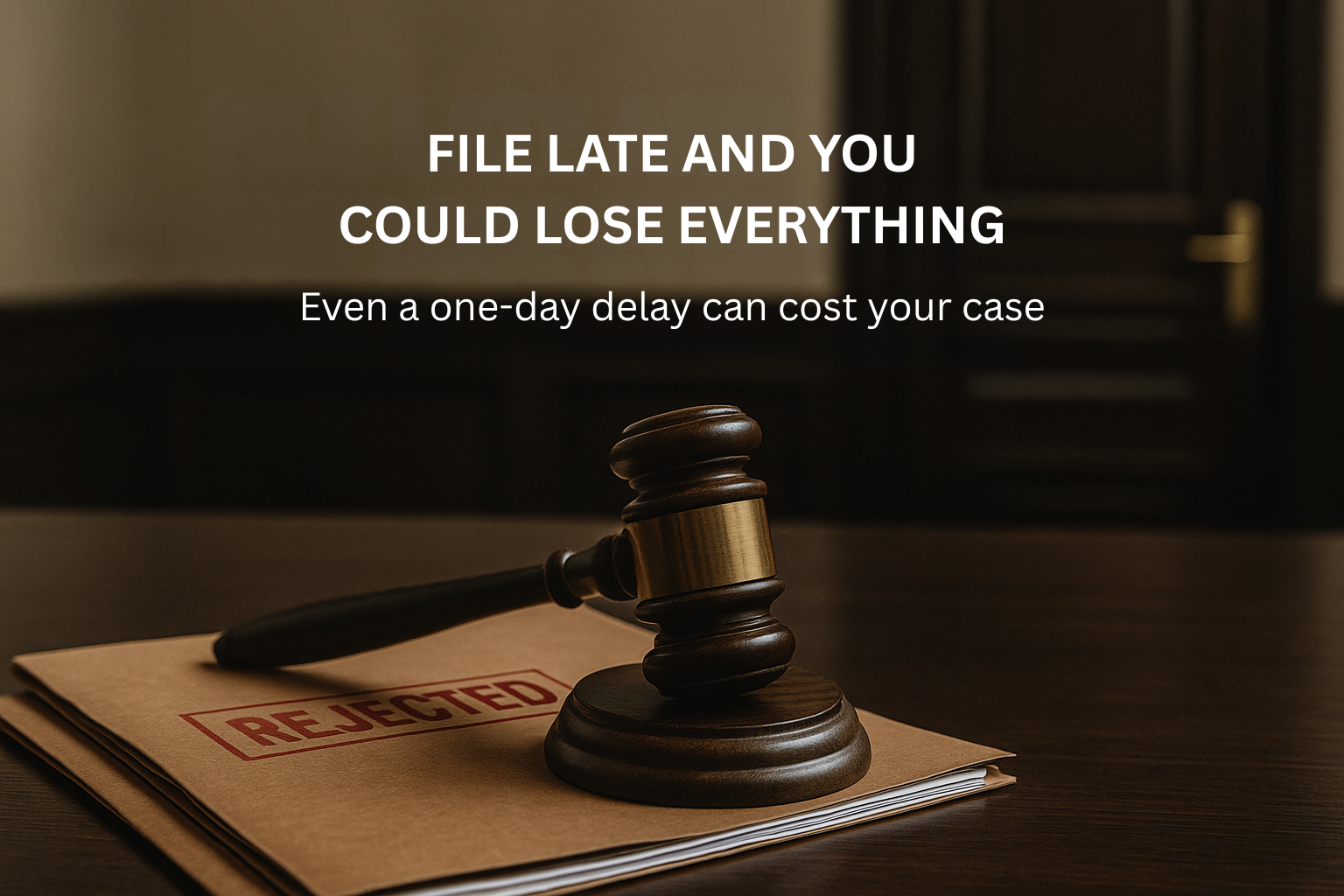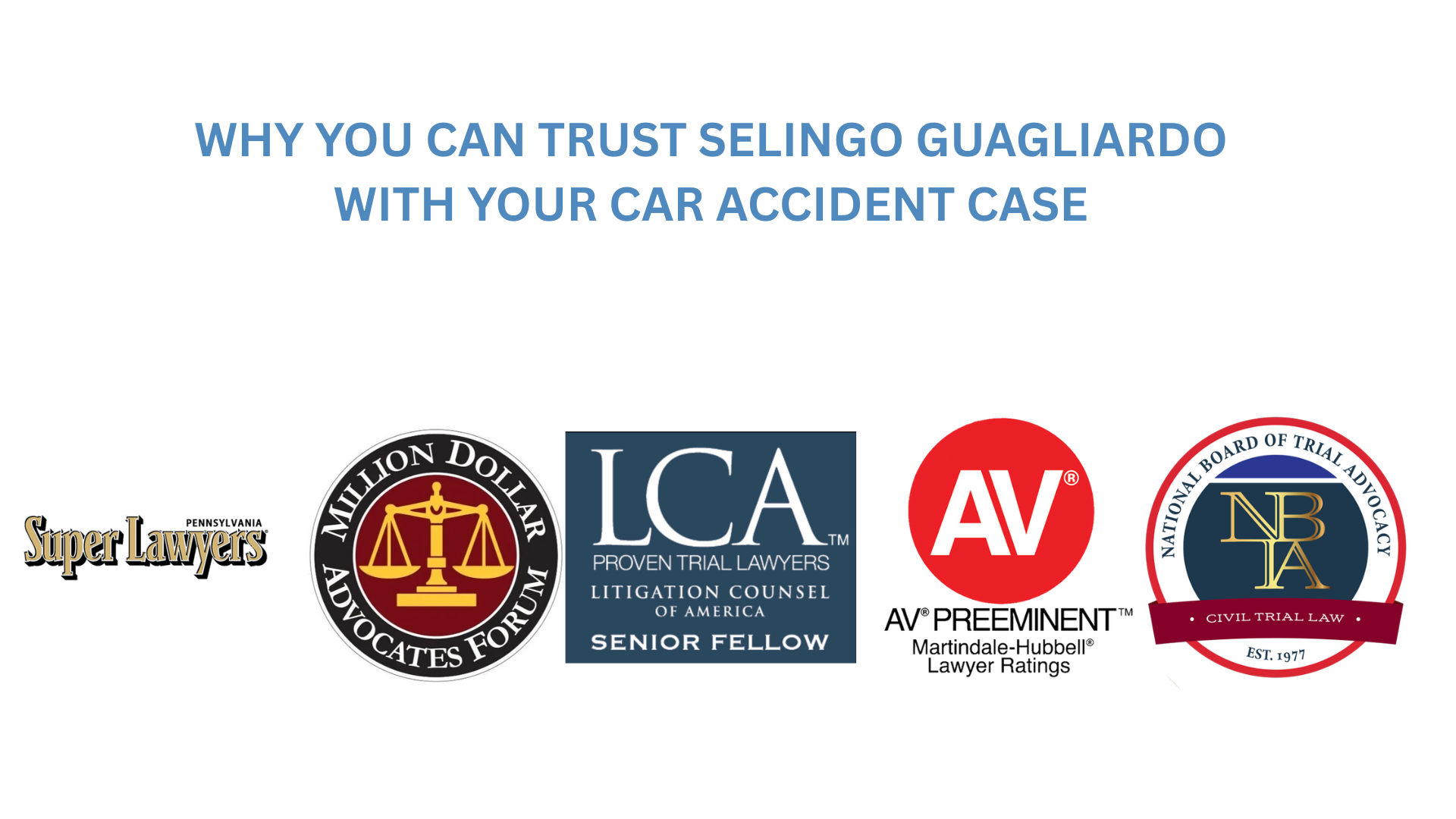Understanding the Statute of Limitations for Car & Motor Vehicle Accidents in Pennsylvania
When you’ve been in a car accident, filing a claim might not be your first concern. Between injuries, car repairs, and dealing with insurance, legal deadlines can feel far off. But waiting too long can cost you everything. That’s where the statute of limitations comes in.
The statute of limitations is the legal deadline for filing a lawsuit. If you miss it, the court will likely throw out your case, no matter how strong your claim might be. You only get one chance to pursue compensation, and timing is a critical part of that process.
Every state has its own rules. In Pennsylvania, the timeline to file a car accident lawsuit is strict, with few exceptions. Whether you’re dealing with a minor fender-bender or a serious injury crash, knowing the deadline could make or break your case.
Selingo Guagliardo has helped accident victims across Pennsylvania take timely legal action. We understand the local court system, the insurance landscape, and how to protect your rights before time runs out.
What Is the Statute of Limitations in Pennsylvania for Car Accidents?
Pennsylvania law gives you two years to file a lawsuit after a car accident. This applies to both personal injury and property damage claims.
The clock starts on the date of the crash, not when you discover the injury or speak to an insurance company. If you file after the two-year deadline, the court can dismiss your case without reviewing any evidence. It doesn’t matter how serious your injuries are or how clearly the other driver was at fault.
This deadline is part of Pennsylvania’s civil code, found in 42 Pa. C.S.A. § 5524. It outlines the statute of limitations for personal injury, wrongful death, and property loss.
The law is strict. Even being one day late can make your case invalid. Courts will not hear arguments about fairness or delays unless you meet very specific legal exceptions, which are rare.
Missing the deadline does more than block you from going to court. It also takes away your leverage in settlement negotiations. Insurance companies track these deadlines closely. If they know you’ve waited too long, they have no reason to offer a fair settlement. They know you can’t sue, so they don’t have to negotiate.
Acting within the legal timeframe keeps all your options open. It also puts you in a stronger position when dealing with adjusters, opposing attorneys, or any other party involved in the case.
The two-year rule gives you time, but not much. If you’re dealing with medical treatment, car repairs, or family obligations after a crash, it’s easy to let weeks or months slip by. That’s why it’s smart to document everything early and speak with an attorney as soon as possible.
Exceptions That Could Change the Deadline
Most car accident claims in Pennsylvania follow a two-year deadline, but there are exceptions. In some cases, the countdown is paused, extended, or shortened based on the facts of the case.
Understanding these exceptions can help you avoid losing a valid claim. If any of the following apply, your legal timeline may be different than the standard rule.
If the Injured Person Is a Minor
When the person hurt in the crash is under 18, the statute of limitations is usually paused. The two-year countdown starts when the person turns 18, giving them until age 20 to file a claim.
Parents or guardians can still file a claim on behalf of the minor before that. But if they don’t, the child still has the right to sue later. This exception protects minors who may not have the ability or support to file right away.
The Discovery Rule
Some injuries don’t appear right away. The discovery rule delays the start of the two-year clock until the injury is discovered, or reasonably should have been discovered.
This often applies to internal injuries, brain trauma, or chronic conditions that don’t show up until days or weeks after the crash. Medical records and expert opinions may be needed to prove when the injury became known.
Claims Involving Government Vehicles or Employees
If a government agency is involved, the rules are different. You must file a formal notice of intent to sue within six months of the crash.
This applies to accidents involving city buses, school vehicles, road crews, or state-owned cars. Missing this notice deadline can block your case before it begins, even if the standard two-year rule would still apply otherwise.
Why Insurance Deadlines and Legal Deadlines Are Not the Same
Filing a lawsuit and filing an insurance claim are two different things. Many people confuse them, but they follow separate rules with separate timelines.
In Pennsylvania, you have two years to file a lawsuit after a car accident. That’s the legal deadline set by the statute of limitations. But insurance companies don’t follow the same timeline. Most policies require that you report the crash right away, often within 24 to 72 hours.
If you wait too long to tell your insurance company about the accident, they may deny your claim. This can happen even if you are still within the legal window to sue. Insurers argue that delays make it harder to investigate the crash or verify the damage.
This is especially true for uninsured or underinsured motorist claims. If you’re hit by a driver with little or no coverage, you may need to turn to your own policy. But if you didn’t report the crash quickly, your insurer may refuse to pay.
Delays can also weaken your position during settlement talks. Insurance adjusters look for reasons to reduce or deny payment. If they see a long gap between the accident and your report, they may question whether the crash caused your injuries at all.
Even if you don’t think you’ll need to file a lawsuit, it’s still smart to notify your insurer promptly. Let them know what happened, when it happened, and who was involved. Keep a copy of the report and note the date you submitted it.
Acting quickly protects your options on both sides. It keeps your legal rights intact while also making sure your insurance coverage stays in place. Don’t wait to report a crash, even if you’re still sorting out what to do next.
What Happens If You Miss the Statute of Limitations?
Missing the statute of limitations in a car accident case can end your claim before it ever begins. Even if the facts are on your side, the court will likely dismiss the case if it’s filed late.
Once the two-year deadline passes, you lose the legal right to sue. That means you may no longer be able to recover compensation for medical bills, lost wages, or pain and suffering. It doesn’t matter how serious your injuries are or how clear the other driver’s fault was. The timing alone can block your case.
The defendant’s lawyer will likely raise the missed deadline as a defense. In most cases, the judge won’t even allow the case to move forward. Courts in Pennsylvania enforce these deadlines strictly. Missing the cutoff by even one day can make your case invalid.
There are a few legal exceptions, but they are difficult to prove. Most involve special circumstances like minors, undiscovered injuries, or cases against government agencies. These exceptions require documentation and often expert testimony to be accepted.
If you think your deadline has passed, speak to an attorney right away. There may still be a narrow path forward, but time is critical. Acting quickly gives your lawyer the best chance to argue for an exception, if one applies.
The best way to protect your rights is to stay ahead of the deadline. Don’t wait for symptoms to get worse or for the insurance company to respond. Once the clock runs out, even the strongest case may be lost forever.
Steps to Take Right After a Car Accident in Pennsylvania
What you do in the hours and days after a car accident matters. These early actions can affect your ability to recover damages, negotiate with insurance, and meet legal deadlines.
Taking the right steps protects your claim and gives you more control over the outcome. Here’s what to do.
Seek Medical Care Immediately
Get checked by a doctor as soon as possible, even if you feel fine. Some injuries take time to appear, and delays in treatment can raise questions about how or when your injuries happened.
Medical records also serve as important evidence. They connect your injuries directly to the crash, which is key for both insurance claims and legal action.
Document the Scene and Injuries
Use your phone to take pictures of the vehicles, the road, your injuries, and any other visible damage. If you’re able, ask witnesses for their contact information and make sure the police file a report.
These details can disappear quickly. Photos and reports help prove what happened and who was at fault.
Notify Your Insurance Company
You’re required to report the accident to your insurer, even if the other driver caused the crash. Waiting too long can lead to a denied claim or reduced coverage.
Give them the facts, but avoid giving a recorded statement or signing anything without legal advice.
Contact a Lawyer Early
A qualified attorney can help you stay within the legal deadline, protect key evidence, and deal with insurance companies. Waiting too long can lead to mistakes, missed paperwork, or lost opportunities.
You only get one chance to file a claim. Having a lawyer from the start gives you the best chance to recover full compensation and avoid costly errors.
Why Trust Selingo Guagliardo With Your Car Accident Case
Selingo Guagliardo has spent decades representing people injured in car and motor vehicle accidents across Pennsylvania. We understand the legal process, and we know what it takes to move fast, protect your rights, and get results.
Deadlines in car accident cases are strict. If you wait too long, you lose your chance to file. Our team makes sure that never happens. From the moment we take your case, we track the clock, preserve evidence, and file the necessary paperwork on time.
We also deal directly with insurance companies. Many of them use delay tactics or make low offers to avoid paying full value. We push back. We know their strategies, and we hold them accountable. Our job is to make sure they take your claim seriously.
If your case goes to court, we’re ready. We prepare every case with the expectation that it could end up in front of a judge. That preparation gives us leverage in negotiations and helps you get the best possible outcome.
You don’t need to worry about upfront costs. We work on a contingency fee basis, which means we only get paid if we win or settle your case. You pay nothing unless we recover money for you.
We take pride in staying accessible. You won’t be passed from one person to another. When you have questions, you’ll get answers. When you need updates, you’ll hear from the lawyer handling your case.
Our focus is on real help, not empty promises. If you’ve been injured in a crash, we’re here to take action and protect your claim before time runs out.
Get a Free Case Evaluation Before Time Runs Out
You only have a limited window to take legal action after a car accident. Once the deadline passes, your right to sue is gone. Waiting can also hurt your chances with the insurance company.
At Selingo Guagliardo, we make it easy to get answers. Our team offers free case evaluations with no pressure and no upfront cost. You’ll speak with someone who understands Pennsylvania law and knows how to move quickly.
If you’re unsure whether you still have time to file, don’t guess. Let us review your case and explain your options. The earlier you act, the more we can do to help.
Frequently Asked Questions (FAQs) About Pennsylvania Car Accident Deadlines
-
In most cases, you have two years from the date of the accident to file a lawsuit for personal injury or property damage. Missing this deadline usually means you lose your right to sue.
-
Yes. In a wrongful death case, the two-year period begins on the date of death, not the date of the accident. This gives the surviving family time to file a separate legal claim.
-
Possibly. Pennsylvania follows the discovery rule for injuries that don’t appear right away. The clock may start when the injury is discovered, but this rule is limited and can be difficult to prove without legal help.
-
You must file a notice of intent to sue within six months of the accident. This applies to city, county, or state agencies, including school buses or municipal vehicles. Failing to meet this deadline can block your claim.
-
Yes. Most insurance policies require prompt notice, often within a few days. Delaying your report can result in a denied claim, even if you still have time to file a lawsuit in court.





